Beny-sur-Mer Cemetery – Paying the Price for Juno Beach
This morning Liberation Tour 2015 explored the multiple Canadian landing points on Juno Beach. Now it’s time to visit Beny-sur-Mer Canadian War Cemetery to determine what the butcher’s bill for that historic Canadian victory will be. In a previous post on Ranville War Cemetery I explained how these cemeteries are laid out, who manages them and identified some resources for gathering more information on the individuals who lie interred here; hopefully putting a face to the soldier. I will not repeat that for Beny-sur-Mer as the same comments apply.
Beny-sur-Mer Canadian War Cemetery
Beny-sur-Mer Canadian War Cemetery can be found at a pleasant, rather bucolic location just over a mile or more back from the Normandy coast where the Canadians came ashore at Juno Beach. There are over 2,000 soldiers buried here, the vast majority Canadians. Although numbers vary slightly, despite the fierce fighting on segments of Juno Beach only 340 Canadians were killed outright that day. The use of the word ‘only’ is strictly in terms of relative deaths by other forces and not meant to diminish in any way the overall numbers that were killed on June 6th. To put it in perspective, more than twice as many Canadians were killed in one day on one three mile stretch of beach then were killed in six years in all of Afghanistan.
The fact that there are nearly 2,000 Canadians buried at Beny-sur-Mer emphasizes two things – many of those wounded on D-Day died later and the fighting didn’t get any easier after June 6th. The breakout from the beaches was a bloody affair that caused more casualties than the landing itself.
After signing the guest book and checking the registry for Dunlops, none here thankfully; I just took in the overall view and once again was struck by the tranquil symmetrical beauty of these war cemeteries.
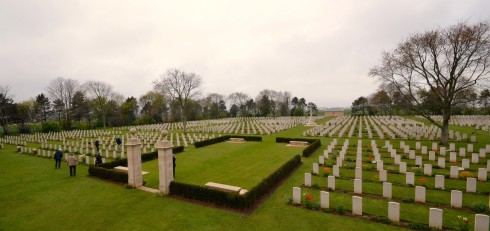
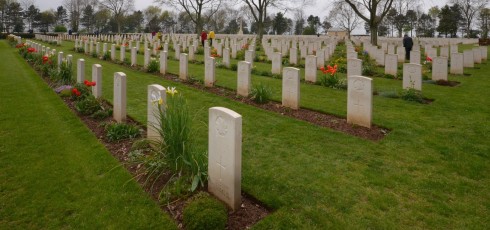
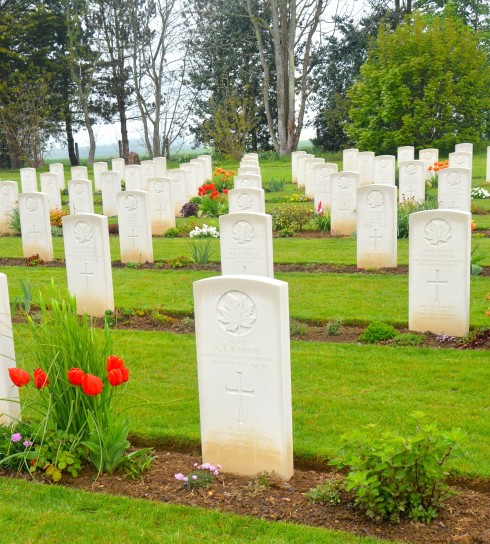
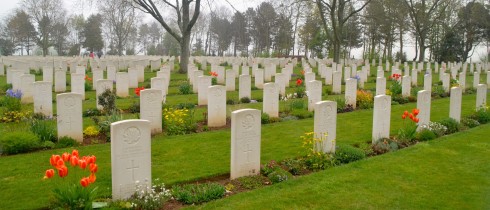
Not only were the grounds of Beny-sur-Mer meticulously maintained, but each grave had flowers in front of or near it. Flowers have always been considered a sign of respect for the deceased and this was a garden of, and for the dead.
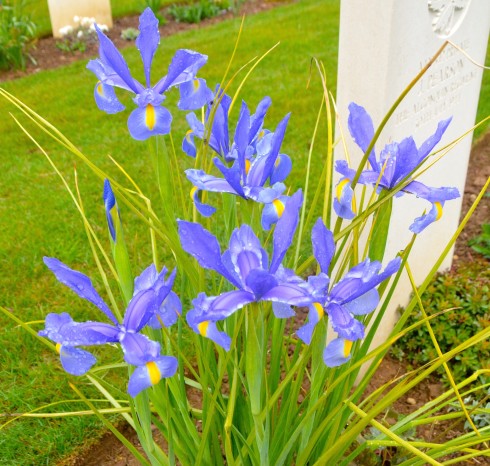
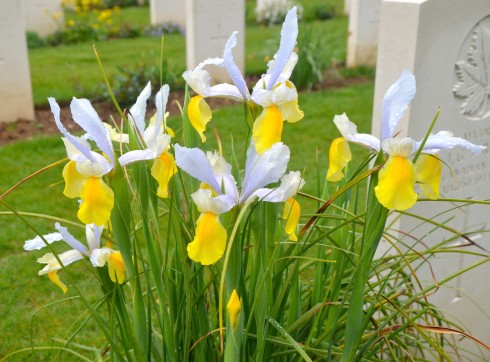

After taking in the big picture I commenced strolling the cemetery aisles looking for the graves of those that might have some connection, either directly or spiritually to myself or my wife Alison. Her uncle John Weir landed at D-Day with the North Nova Scotia Highlanders or North Novas as they were usually referred to. The regiment fought its way up the coast as part of the 3rd Canadian Army all the way deep into Holland. Along the way many were killed including John Weir at Boulogne in September of 1944. Today Alison and I are looking for any North Novas and there’s no shortage of them.
Here is H. J. McGregor or more fully Harold Joseph McGregor of New Waterford, Nova Scotia. He was the son of Dan and Jane McGregor and husband of Eva McGregor. At 33 years of age he would have been a man among many boys.
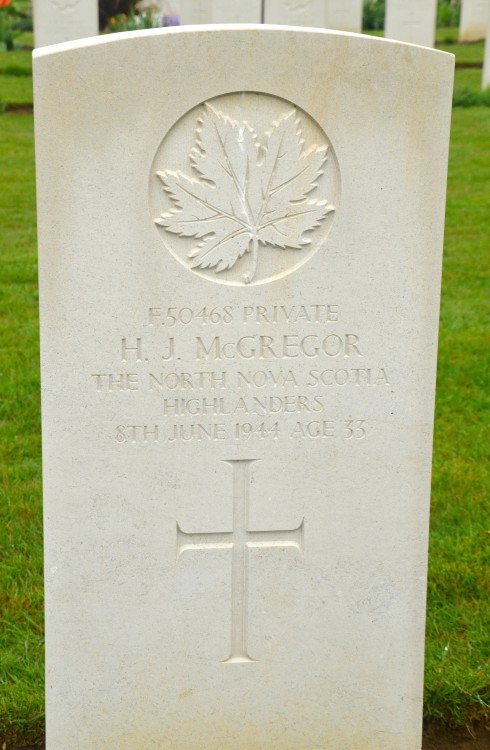
Here is Captain F.C. Fraser or Frederick Charles Fraser or Charlie as he was actually called according to this article in the Eastern Chronicle published in New Glasgow Nova Scotia February 22, 1945.
Eastern Chronicle. New Glasgow, N.S.
Thursday, February 22, 1945:
HONORED BY THE CHIEF
One of the saddest things in this war is that so many brilliant young men
who have shown great gallantry and courage are stricken down before they can
enjoy one signal honour showered upon them. A striking instance is the
lamented death in action of Captain F.C. Fraser, son of Dr. and Mrs. F.E.
Fraser.
He played an heroic part in the early struggle in France. He braved the
most terrific dangers and made the Supreme Sacrifice.
A young lad of rare qualities, he was a student in New Glasgow. Here he
grew up and had a great host of personal friends.
He was outstanding in the Boy Scouts and naturally at the first opportunity
he volunteered for national services. Everyone who came within his range
were extremely fond of Charlie Fraser and he proved to be worthy of all
attention shown him.
In the service he soon attained the post of Captain and where the action
was hottest he was found heroically doing his duty.
He died in France and fitting tribute has been paid to his memory.
Here is one from his Commander-in-Chief, Field Marshall B.L. Montgomery,
that is particularly impressive and something that his bereaved parents will
ever cherish.
21st ARMY GROUP
Captain F.C. Fraser
North Nova Scotia Highlanders
It has been brought to my notice that you have performed outstandingly
good service and shown great devotion to duty during the campaign in France.
I award you this certificate as a token of my appreciation and I have
given instructions that this shall be rooted in your record of service.
B.L. Montgomery
Field Marshall
Commander in Chief
21st Army Corps
Date, June 1944
A letter from his immediate superior officer is also of great importance.
It reads-
Mrs. Dorothy Fraser,
New Glasgow, N.S.
Canada.
Dear Mrs. Fraser,
You will find enclosed a Certificate of Honour awarded to your son
Charlie, by his Commander-in-Chief.
This honour which ranks high in the scale of awards of gallantry,
confirms our high opinion of your son.
I fully realize that nothing can compensate for your great loss. However
the knowledge that Charlie’s work was this appreciated by his
Commander-in-Chief may be of some small comfort. His efforts were not in
vain.
He is missed by his brother officers and men alike. We salute a brave and
loyal soldier.
Yours sincerely,
D.F. Forbes
Lt. Col. commanding North Scotia Highlanders.
He sounds like he was an outstanding young man and now he lies forever at Beny-sur-Mer.
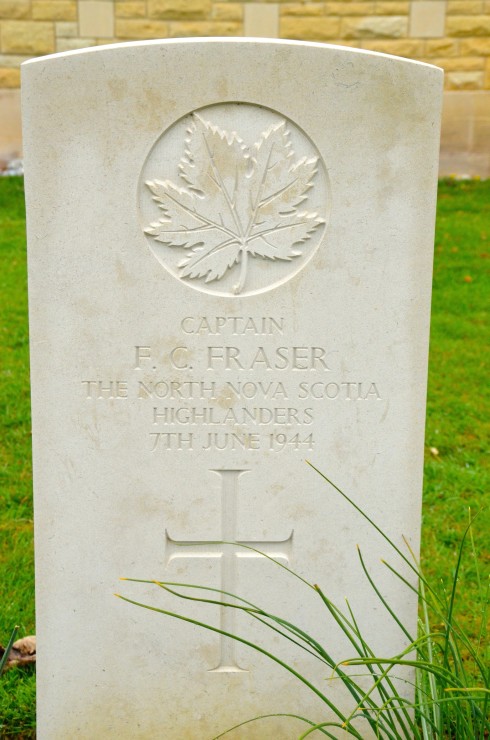
The North Novas were in the second wave at Bernieres-sur-Mer and suffered only four deaths on D-Day, but an incredible seventy-three on June 7th in advancing on the village of Vuron, including Captain Fraser. Here is a link to an excerpt from Will. R. Bird’s No Retreating Footsteps that describes the events of June 7th.
Next at Beny-sur-Mer is W. L. Izzard or William Lyall Izzard of Barney’s River Station, Nova Scotia. He was the son of William Archibald Izzard and Annie Louise Izzard. The Izzard’s are a well known black family in Pictou County and his enlistment in the North Novas stands in sharp contrast to the segregation still practised by the United States military in WWII.
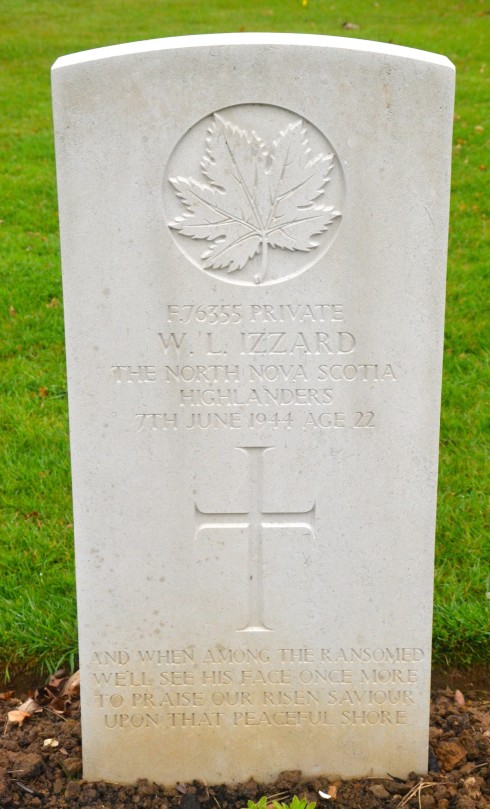
Here’s a picture of A Company of the North Novas and William Izzard is second from the left on the second row from the top.
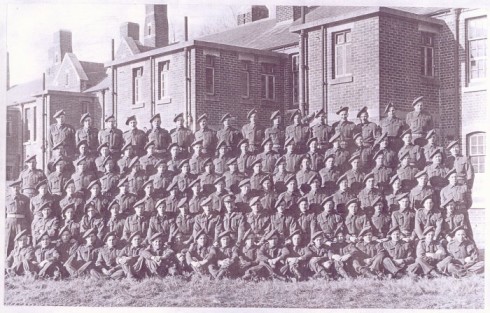
Finally here is a newpaper report of his death providing more information about him, turning him into a real person who lived and breathed and was looked up to and loved and ultimately, sorely missed.
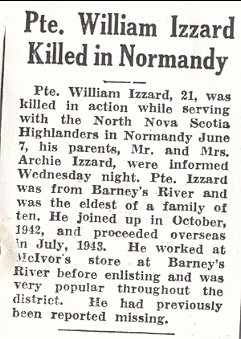
The last of the North Novas I’ll feature in Beny-sur-Mer is A. Julian or Anthony Julian from Sydney Mines, Nova Scotia. He was the son of Charles and Mary A. Julian and he also died on that terrible June 7th day for the North Novas. He may well have been Indigenous as that is a common such name in Cape Breton.
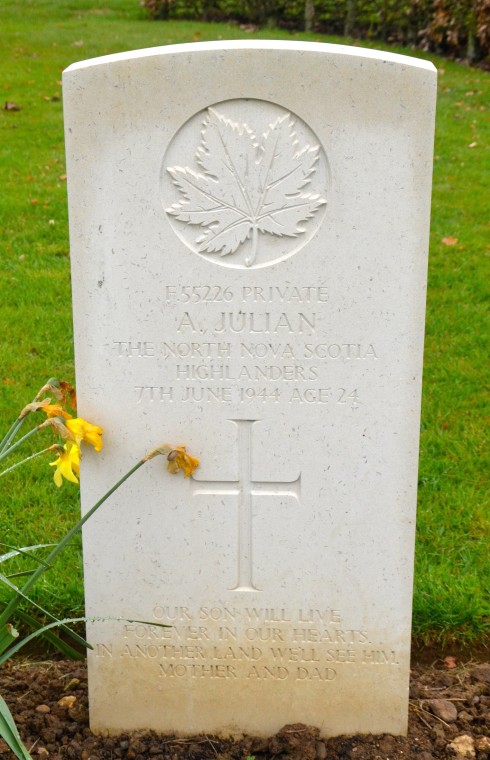
The final headstone at Beny-sur-Mer, that I think bears reflection on is that of P.J. Mount or Philip James Mount of the Royal Canadian Corps of Signals. He was from Toronto and was the son of Lucy L. Mount. I couldn’t find anything else about him, but did find his name at page 20 of the Corps Book of Remembrance.
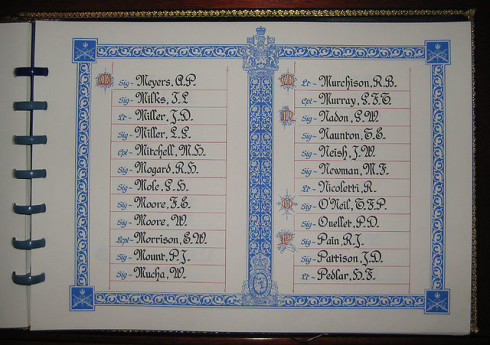
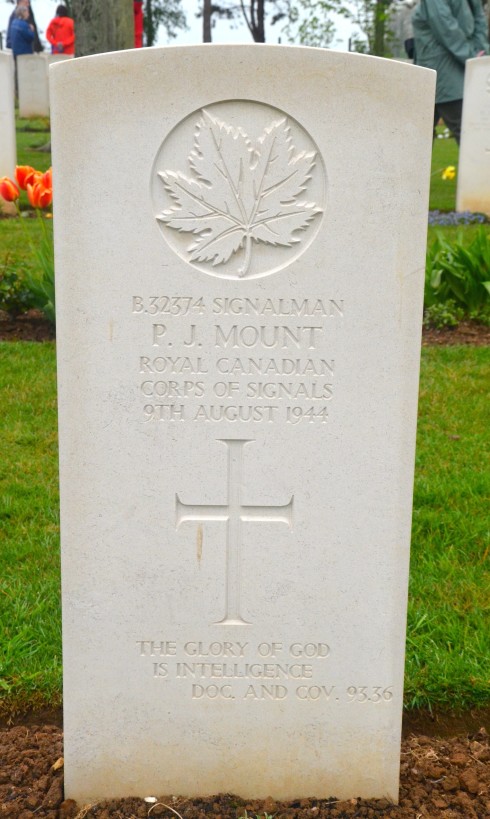
What I found intriguing about Philip Mount’s grave was the inscription at the bottom, “The glory of God is intelligence”, followed by DOC. and COV. 93.36. A little research indicates that it is from the Book of Mormon and the entire passage reads “The glory of God is intelligence, or, in other words, light and truth.”
This is but one of the many, many headstones at Beny-sur-Mer with family inscriptions, actually probably the majority, that either directly or indirectly bring God into the equation. The idea that there is a God that would condone the wars of men and willingly accept the sacrifice of millions of young lives as necessary, I find astounding. Wars are started, fought and ended by human beings and to try to shift the blame elsewhere is a formula for never coming to terms with the real cause – us. If there is a God, I bloody well can’t conceive that war is his will. The phrase, “God willing” is a copout.
Sorry to end on a sour note, but the more I research and find out the details of the lives and deaths of these young men, the madder I get. Tomorrow go to Pointe du Hoc where the United States Rangers accomplished an incredible feat, followed by a visit to the American slaughterhouse at Omaha Beach. See you there.

